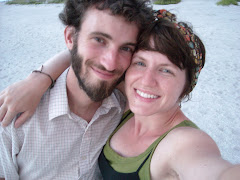Despite the current global financial crisis, MCC Dezam is hiring a new person to work on the reforestation team. We're specifically hiring a woman to even out the gender balance on our team, and Sharon and I were both pretty interested to see how the process would play out.
A few weeks ago we sat down as a team and wrote a list of criteria. Among other things, we wanted an agricultural technician with team spirit, creativity, flexibility, and skill in capacity-building. Asking the team to participate in this process was important, because hiring here is a difficult dance around nepotism. We received 9 applications from qualified individuals, all of whom were known by at least one of our coworkers. Through a secret-ballot scoring process with each person choosing their top three candidates, the team narrowed down the candidates to be interviewed to 2.
I was asked to sit in on the interviews this week, and was supposed to come up with a few of the questions. I did what every red-blooded American does when in need of information: I Googled "typical interview questions." Of course I found hundreds of the same old old standards everyone expects to hear on an interview. W e narrowed down our list to 18 questions, and each person on our interviewing committee scored the response with a 1-5 scale. I quickly realized these questions I think of as "standard" are not at all standard here. I chalk confused and evasive responses up to the fact that these questions really are weird unless you were raised in a Western culture:
Us: "Where do you see yourself in 5 years?"
Both candidates: [puzzled look]
Us: "Where do you want to be in your career or personal life in 5 years?"
Both candidates: "Working for MCC in Desarmes, of course."
I was reminded that this new position is most likely a life job for our new hire, as finding another decently-paying job will be difficult at best.
Us: "The average MCC day varies a lot. Do you feel like you can be flexible when it comes to work?"
Both candidates: "Flexible, flexible...can you define the word?"
After that, one candidate described her physical flexibility.
I wondered if fleksib is not actually a kreyol word, although Jean designed the question.
Us: "Tell me your strengths and weaknesses."
Candidate: "I have no weaknesses."
Not every culture is so open with admitting personal strengths and weakness as ours, I guess, and no one has coached them on how to list weaknesses that are really strengths.
Us: "What would you do if you had MCC work and a personal obligation at the same time? How would you handle that?"
Candidate: "I would wake up earlier."
Us: "No, we mean at the exact same time."
Candidate: "Like I said, I would wake up earlier."
Us: "What parts of this job do you look forward to more than others?"
Both candidates: "I look forward to everything equally. I have no work preferences."
Maybe they really do like it all.
Us: "If we hire you, what salary are you looking for?"
Both candidates: "I will accept whatever the good people at MCC deem as a good salary."
Like I said, there are not a lot of jobs out there, so who wants to be picky?
Afterwards, I asked our team what they preferred: the truth, or an answer they wanted to hear. For example, if I were being interviewed and I described a weakness, and another person said "I have no weaknesses," who would they think was a stronger candidate? The person with no weaknesses, of course. They wanted the candidates to be honest, but it's still hard to hear someone describe their weaknesses. That was kind of tough for me to hear, since I had the exact opposite response.
Overall, the process reminded us that economic development is difficult and uneven. If a person in a developing nation goes to school and earns a degree, there's no guarantee that the job market will be able to provide a position upon graduation. It's common for people here to have no work experience, although they graduated from agricultural school ten years ago. In the U.S., we're used to candidates seeking professional positions to have significant, relevant work experience. Here our new colleague will establish all her work experience with MCC Desarmes.
The interview committee decided that they want to hire the second candidate, who was actually a stronger interviewee. Sharon questioned whether the committee just like her more than the other person or whether they really like her (i.e., should we continue interviewing more people?). Each affirmed the choice - so we're inviting her to start work in March. We'll let you know how it goes.
Wednesday, January 21, 2009
Subscribe to:
Post Comments (Atom)


No comments:
Post a Comment